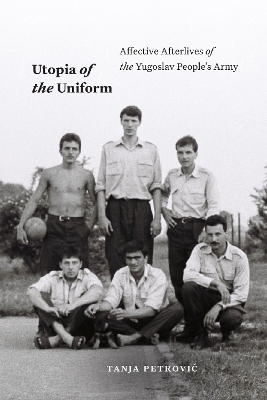
Utopia of the Uniform
Affective Afterlives of the Yugoslav People's Army
Seiten
2024
Duke University Press (Verlag)
978-1-4780-2094-3 (ISBN)
Duke University Press (Verlag)
978-1-4780-2094-3 (ISBN)
Tanja Petrović draws on interviews with dozens of veterans of the Yugoslav People’s Army to show how their experiences in the military provided a framework for bringing the key political ideas of collectivity, solidarity, egalitarianism, education, and comradeship into being.
The compulsory service for young men in the Yugoslav People’s Army (JNA) created bonds across ethnic, religious, and social lines. These bonds persisted even after the horrific violence of the 1990s, in which many of these men found themselves on opposite sides of the front lines. In Utopia of the Uniform, Tanja Petrović draws on memories and material effects of dozens of JNA conscripts to show how their experience of military service points to futures, forms of collectivity, and relations between the state and the individual different from those that prevailed in the post-Yugoslav reality. Petrović argues that the power of repetitive, ritualized, and performative practices that constituted military service in the JNA provided a framework for drastically different men to live together and befriend each other. While Petrović and her interlocutors do not idealize the JNA, they acknowledge its capacity to create interpersonal relationships and affective bonds that brought the key political ideas of collectivity, solidarity, egalitarianism, education, and comradeship into being.
The compulsory service for young men in the Yugoslav People’s Army (JNA) created bonds across ethnic, religious, and social lines. These bonds persisted even after the horrific violence of the 1990s, in which many of these men found themselves on opposite sides of the front lines. In Utopia of the Uniform, Tanja Petrović draws on memories and material effects of dozens of JNA conscripts to show how their experience of military service points to futures, forms of collectivity, and relations between the state and the individual different from those that prevailed in the post-Yugoslav reality. Petrović argues that the power of repetitive, ritualized, and performative practices that constituted military service in the JNA provided a framework for drastically different men to live together and befriend each other. While Petrović and her interlocutors do not idealize the JNA, they acknowledge its capacity to create interpersonal relationships and affective bonds that brought the key political ideas of collectivity, solidarity, egalitarianism, education, and comradeship into being.
Tanja Petrović is Head of the Institute of Culture and Memory Studies at the Research Center of the Slovenian Academy of Sciences and Arts. She is the author of numerous books, including A Long Way Home: Representations of the Western Balkans in Political and Media Discourses.
Acknowledgments ix
Introduction. A Silent Force That Unsettles Ruins 1
1. History, Stories, and Selves 22
2. A Barbed-Wire Utopia 37
3. The Routine 61
4. The Uniform 76
5. The Ritual 96
6. Dissolution of Form 118
Interlude. The Catastrophe 128
7. The Aftermath 134
8. Form and Life 153
9. Afterlives 173
Epilogue. An Infrastructure for Feelings 185
Notes 195
Bibliography 217
Index 231
| Erscheinungsdatum | 08.12.2023 |
|---|---|
| Reihe/Serie | Theory in Forms |
| Zusatzinfo | 55 illustrations |
| Verlagsort | North Carolina |
| Sprache | englisch |
| Maße | 152 x 229 mm |
| Gewicht | 567 g |
| Themenwelt | Geisteswissenschaften ► Geschichte ► Regional- / Ländergeschichte |
| Sozialwissenschaften ► Ethnologie | |
| Sozialwissenschaften ► Soziologie ► Gender Studies | |
| ISBN-10 | 1-4780-2094-6 / 1478020946 |
| ISBN-13 | 978-1-4780-2094-3 / 9781478020943 |
| Zustand | Neuware |
| Haben Sie eine Frage zum Produkt? |
Mehr entdecken
aus dem Bereich
aus dem Bereich
Erinnerungen
Buch | Softcover (2024)
Pantheon (Verlag)
16,00 €


